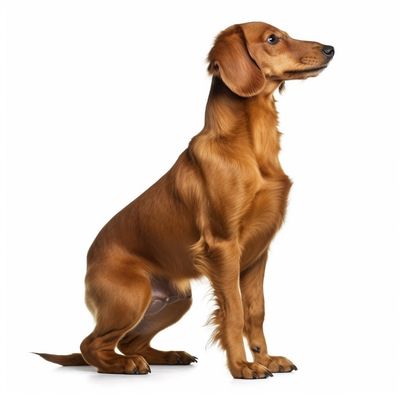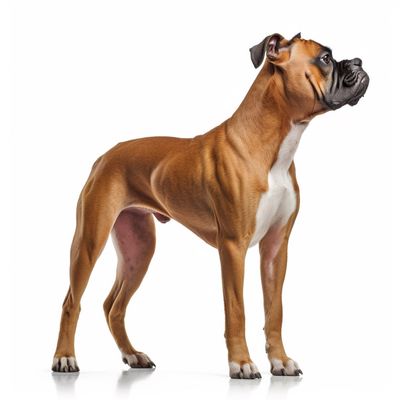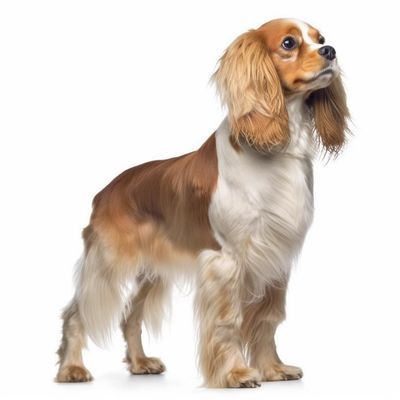Dachshund - vs - Boxer - vs - Cavalier King Charles Spaniel

Dachshunds are small dogs, weighing 16-32 lbs for the standard size and 8-11 lbs for the miniature size, with a height of 8-9 inches.
Dachshunds are active and lively but don't require an excessive amount of exercise.
Dachshunds enjoy daily walks and playtime to maintain their physical and mental health.
Dachshunds can be stubborn, but with patience and consistency, they can learn commands and tricks.
Dachshunds are intelligent dogs but can be independent thinkers, which may make training challenging at times.
Dachshunds are adaptable and can thrive in various living situations, including apartments and houses.
Dachshunds can be good with kids, especially when socialized from a young age.
Dachshunds can get along well with other pets when properly socialized.
Dachshunds can tolerate mild cold weather, but they should be protected from extreme cold due to their short legs and low body clearance.
Dachshunds can handle some heat but should be provided with shade, water, and limited time outdoors in high temperatures.
Dachshunds have low shedding, depending on their coat type (smooth, longhaired, or wirehaired).
Grooming needs for Dachshunds depend on their coat type but are generally low maintenance.
Dachshunds tend to bark more frequently and may require consistent training to manage their barking.
Dachshunds may have some health issues, requiring regular veterinary checkups and preventative care.

Boxers are medium to large dogs, weighing 55-70 lbs and standing 21.5-25 inches tall.
Boxers are energetic, playful, and love engaging in physical activities with their family.
Boxers need daily exercise, such as walks, runs, or playtime to keep them happy and healthy.
Boxers are intelligent, but their independent nature requires patience and consistency in training.
Boxers are quick learners and can excel in obedience training and dog sports.
Boxers can adapt to different living situations but thrive in homes with access to outdoor space.
Boxers are affectionate, patient, and protective, making them wonderful companions for children.
Boxers can get along with other pets, especially when properly socialized from a young age.
Boxers can tolerate mild cold but need extra care in extreme cold due to their short coats.
Boxers can handle warm climates, but make sure to provide shade, water, and avoid excessive exercise.
Boxers have a short coat that sheds moderately, so regular brushing can help minimize shedding.
Boxers have low grooming needs – occasional brushing and bathing will keep them clean and healthy.
Boxers have average bark tendencies and may bark for various reasons, such as alerting their owners or during playtime.
Boxers may have some health issues, requiring regular veterinary checkups and preventative care.

Cavaliers have a moderate energy level and enjoy a mix of playtime and relaxation.
Cavaliers need daily exercise, such as walks or playtime, to stay happy and healthy.
Cavaliers are eager to please and can be trained easily with positive reinforcement.
Cavaliers are intelligent dogs that enjoy learning new commands and tricks.
Cavaliers adapt well to various living situations, from apartments to country homes.
Cavaliers are gentle, affectionate, and patient, making them excellent companions for children.
Cavaliers get along well with other pets, including dogs and cats, when socialized properly.
Cavaliers can tolerate mild cold but need extra care in extreme cold due to their silky coats.
Cavaliers can handle warm climates, but make sure to provide shade, water, and avoid excessive exercise.
Cavaliers have a silky coat that sheds moderately, so regular brushing can help minimize shedding.
Cavaliers require regular brushing and occasional bathing to keep their coats healthy and tangle-free.
Cavalier King Charles Spaniels bark occasionally, usually only when necessary or provoked.
Cavalier King Charles Spaniels may have some health issues, requiring regular veterinary checkups and preventative care.



